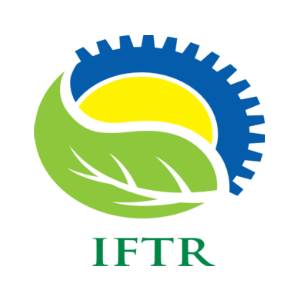Cause Area
Primary Sectors
Financials
-
2024
Total IncomeRs.810,000Total ExpensesRs.810,000Non Program ExpensesRs.30,000Program ExpensesRs.780,000Tip: Click on any value above to exclude it.
Geographies Served
Programs
-
Sustainable Agricultural Development
District
Tiruvallur
Chittoor
Tiruvannamalai
States
Andhra Pradesh
Tamil Nadu
IFTR is working with 1500 farmers in 50 villages. The number is increasing monthly, and IFTR aims to reach 5000 farmers at the end of 2024-2025.
These activities are supported by the following entities
`1) M/s. Shri AMM Murugappa Chettiar Research Centre (MCRC), Chennai
2) Department of Agriculture, Govt of Tamilnadu, Thiruvalangadu Block, Tamilnadu -
Potable Water Supply for Tribal Villages
District
Tiruvannamalai
States
Tamil Nadu
IFTR has established 15 solar assisted water pumping facilities attached with TATA Swach water filters. The solar pumps are placed 100 meters to 1 km apart from the wells to the villages /hamlets. The villagers can get @2000 litres per hour through the solar assisted pumping.
These activities are supported by the following entities
`1) M/s. Shri AMM Murugappa Chettiar Research Centre (MCRC), Chennai
2) Sunlit Futures, Auroville
3) Grundfos Pumps
4) Shape Foundation, Pune -
Solar Street Lights for Tribal Villages
District
Tiruvannamalai
States
Tamil Nadu
This programme has provided solar assisted street lights to 10 villages in Jawadhu Hills, Tiruvannamali District, Tamilnadu. These lights helps 500 village people to have access to night even in the midnight.
These activities are supported by the following entities
`1) M/s. Shri AMM Murugappa Chettiar Research Centre (MCRC), Chennai
2) Sunlit Futures, Auroville -
Solar Lighting for Tribal Households
District
Tiruvannamalai
States
Tamil Nadu
This programme has provided solar lamps for 500 households in 7 villages in Jawadhu Hills, Tiruvannamali District, Tamilnadu. This provides access to light to the children to read as well as women to cook food in the night.
These activities are supported by the following entities
`1) M/s. AT & T, Bangalore
2) M/s. Goodera, Bangalore -
Digital Literacy for Alternative Education to Tribal Children
District
Tiruvannamalai
States
Tamil Nadu
Four Forest Department Managed Middle Schools were given with digital screens and the curriculum in Tamil is given to them in Hard discs as no internet connectivity is there.
These activities are supported by the following entities
`1) M/s. Shri AMM Murugappa Chettiar Research Centre (MCRC), Chennai
2) M/s. Vidya Shakthi, Chennai (associated with Pravartak, IITM, Chennai)
3) Forest Department, Government of Tamilnadu -
Biofortified Crop for Nutritional Improvement and Health
District
Tiruvallur
Chittoor
Tiruvannamalai
States
Andhra Pradesh
Tamil Nadu
Seeds of Biofortified paddy and pearl millet seeds were given to farmers to grow crops that has the natural capabilities to take up more zinc and iron respectively.
The zinc-rich paddy seeds are given to farmers in Thiruvalangadu Block, Tiruvallur District, Tamilnadu and Vijayapuram Mandal, Chittoor District, Andhra Pradesh.
The iron-rich Pearlmillet seeds are to tribal farmers in Jawadhu Hills, Tiruvannamalai District, Tamilnadu. Pearl millet is still used as a staple food by the Malayali tribes in Jawadhu Hills and the produce is used by them for their consumption.
These activities are supported by the following entities
`1) M/s. Shri AMM Murugappa Chettiar Research Centre (MCRC), Chennai
2) M/s. Harvest Plus, ICRISAT, Hyderabad
3) M/s. Indian Institute of Rice Research, Hyderabad -
Adolescent Nutrition Programme
District
Chennai
States
Tamil Nadu
This programme aims at creating awareness among adolescent girls in various schools and colleges in Chennai.
These activities are supported by the following entities
`1) M/s. Anna Adarsh College for Women, Chennai
2) M/s. Queen Mary's College for Women, Chennai
3) M/s. JBAS College for Women, Chennai -
Nutrition for Lactating Mothers
District
Chennai
States
Tamil Nadu
This programme was conceived along with M/s. Chennai corporation and M/s. Queen Mary's College to create awareness among lactating mothers from the underprivileged areas on the importance of good food and nutrition.
These activities are supported by the following entities
`1) M/s. Queen Mary's College, Chennai
2) M/s. Municipal Corporation, Chennai
Impact Metrics
-
Number of Beneficiaris
Program Name
All Programmes
Year-wise Metrics- 2021-22 500
- 2022-23 2700
- 2023-24 4999
Registration Details
-
PAN Card
AAAAI9688M
-
Registration Number
605/2002
-
CSR Form 1
CSR00027826
-
80G
CIT(EXEMPTION), CHENNAI/80G/2019-20/A/10185
-
12A
AAAAI9688M/05/18-19/S-0968
-
FCRA
NA
About
-
Headquarters
Chennai, Tamil Nadu
-
Since
2002
Impact
IFTR has reached 1500 farmers in 50 villages in Thiruvalangadu Block, Thiruvallur District, Tamilnadu, 500 farmers in Vijayapuram Mandal, Chittoor District, Andhrapradesh and 1000 tribals in 45 villages in Jawadhu Hills, Thiruvannamalai District, Tamilnadu. IFTR has been helping 500 children to get supplementary education through digital literacy programme.
Vision and Mission
Vision: To design, develop, and disseminate technologies aimed at promoting sustainable happiness among the masses. Mission: IFTR is committed to fostering self-sustainability within society by conducting programs of social and rural significance, focusing on livelihood provision, income generation, and the upliftment of the underprivileged.
Political & Religious Declarations
-
Political Affiliation
-
Religious Affiliation
Location
-
Headquarters
G1, Shah Flats, 5, 1st Street, Thillai Ganga Nagar Nanganallur, Chennai - 600061, Tamil Nadu, India
Directions, Chennai, Tamil Nadu -
Offices in Cities
Other Details
-
Type
Non-profit
-
Sub Type
Society
Website
Technology Adoption
-
SOC 2 Compliant
No
-
Financial Management
-
Beneficiary Management



